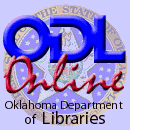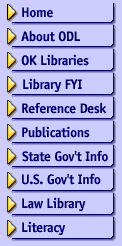

|
|
|
|
|
|

The Oklahoma Literacy Resource Office
Oklahoma
Dept. of Libraries
200 NE 18th St
Oklahoma City,
Oklahoma
73105-3298
(405) 522-3205
(405) 525-7804—FAX
Literacy
Fact Sheet:
Literacy and Learning Disabilities
“I didn’t know I was dyslexic until I was 32 years old. I went all the way through medical school without knowing it. Then, when I was a resident in Boston, I was dating a schoolteacher who noticed I couldn’t read out loud. My recurring nightmare is that I don’t quite make it through the final semester, and I have to return all my degrees.” —Delos Cosgrove, MD
Dr. Delos Cosgrove overcame years of reading struggles to become a cardiac surgeon, author, and inventor, and is currently president and chief executive officer of Cleveland Clinic. As CEO, he presides over a $4.6 billion healthcare system comprised of the Cleveland Clinic, nine hospitals and fourteen surgery centers. Under his leadership, Cleveland Clinic has been ranked among the top three hospitals in America with the heart program ranked number one in the nation for ten years in a row.
What is a Learning Disability?
From the Learning Disabilities Association of America
A learning disability is a neurological disorder that interferes with an individual’s ability to store, process, or produce information. An estimated 60% of adults with severe literacy problems have undetected or untreated learning disabilities (National Adult Literacy and Learning Disabilities Center).
Individuals with learning disabilities are not “dumb” or “lazy.” They often have average or above average intelligence. A learning disability can’t be cured or fixed, it is a lifetime issue. However, individuals with learning disabilities can be successful learners.
John Lennon, Agatha Christie, Albert Einstein, and Thomas Edison all had some form of learning disabilities yet achieved great success in their careers.
Common Learning Disabilities
Dyslexia—affects reading and related language-based processing skills
Dysgraphia—affects a person’s handwriting ability and fine motor skills
Dyscalculia—affects a person’s ability to understand numbers and math facts
Signs of a Learning Disability
While there is no one “sign” that a person has a learning disability, there are certain clues. Individuals with learning disabilities may:
- have trouble learning the alphabet, rhyming words, or connecting letters to their sounds
- make many mistakes when reading aloud, and repeat and pause often
- not understand what he or she reads
- have trouble with spelling
- have very messy handwriting or hold a pencil awkwardly
- struggle to express ideas in writing
- have a limited vocabulary
- have trouble remembering the sounds that letters make or hearing slight differences between words
- have trouble understanding jokes, comic strips, and sarcasm
- have trouble following directions
- mispronounce words or use a wrong word that sounds similar
- have trouble organizing what he or she wants to say or not be able to think of the word he or she needs for writing or conversation
- confuse math symbols and misread numbers
- not be able to retell a story in order (what happened first, second, third)
- not know where to begin a task or how to go on from there
From Center for Parent Information and Resources:
Free checklist—A downloadable learning disabilities checklist for children and adults is available from the National Center for Learning Disabilities.
Assessment—Only licensed professionals can accurately determine the presence of a learning disability.
Challenges
excerpted from "Adults Suffer From Learning Difficulties, Too" by Scott E. Smith, LD Online
Adults struggling with a learning disability face many challenges in life. Adjustments must be made in work, education, daily routines, and social interactions. They also often have to deal with secondary emotional issues such as frustration and low self-esteem. In addition to understanding the disability and personally working to overcome it, assistance may also come from situation accommodations and technology. Some adult schools and employers now recognize learning disabilities and offer options to help. This help includes use of technologies devices, alternative assignments, tutoring, extended time for work completion, organizational aids, and perhaps most important-understanding and patience.
Learning disabilities are now recognized by the Federal Rehabilitation Act and the Americans with Disabilities Act to help accommodate learning differences and minimize discrimination. Knowing one's legal rights is important, but perhaps even more important is facing head-on the challenges of a learning disability.
Accommodations
Accommodations are modifications to the task, job, assignment, etc. that make it possible for individuals with learning disabilities to be successful without providing an unfair advantage. These modifications might include allowing more time for a task, recording lessons, or taking frequent breaks.
For more information read "Common Modifications and Accomodations" by Erich Strom, Understood
Resources and Information
The State of Learning Disabilities: Facts, Trends and Emerging Issues, 2014
Learning Disabilities Association of America
National Center of Learning Disabilities
To contact staff of the Literacy Resource Office, use ODL's Staff Contact Form or Department Contact Form.
